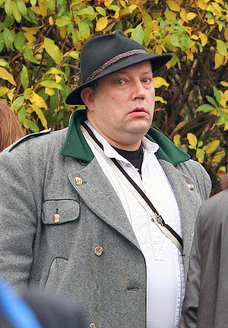Political Soldier is a political concept associated with the Third Position. It played a leading role in Britain's National Front from the late 1970s onwards under young radicals Nick Griffin, Patrick Harrington and Derek Holland of the Official National Front. The term was used to indicate an almost fanatical devotion to the cause of nationalism, which its supporters felt was needed to bring about a revolutionary change in society.

Strasserism is an ideological strand of Nazism which adheres to revolutionary nationalism and to economic antisemitism, which conditions are to be achieved with radical, mass-action and worker-based politics that are more aggressive than the politics of the Hitlerite leaders of the Nazi Party. Named after brothers Gregor and Otto Strasser, the ideology of Strasserism is a type of Third Position, right-wing politics in opposition to Communism and to Hitlerite Nazism.
Column 88 was a neo-Nazi paramilitary organisation based in the United Kingdom. It was formed in the early 1970s, and disbanded in the early 1980s. The members of Column 88 undertook military training under the supervision of a former Royal Marine Commando, and also held regular gatherings attended by neo-Nazis from all over Europe. The name is code: the eighth letter of the alphabet 'HH' represents the Nazi greeting 'Heil Hitler'. Journalist Martin Walker described Column 88 as a "shadow paramilitary Nazi group".
The Flag Group was a British far-right political party, formed from one of the two wings of the National Front in the 1980s. Formed in opposition to the Political Soldier wing of the Official National Front, it took its name from The Flag, a newspaper the followers of this faction formed after leaving and regrouping outside the main and diminishing rump of the rest of the party.
Martin Guy Alan Webster is a British neo-Nazi, a former leading figure on the far-right in the United Kingdom. An early member of the National Labour Party (NLP), he was John Tyndall's closest ally, and followed him in joining the original British National Party (BNP), the National Socialist Movement (NSM) and the Greater Britain Movement. Webster also spent time in prison for helping to organise a paramilitary organisation, Spearhead, and was convicted under the Public Order Act 1936. Rumours of his homosexuality led to him becoming vilified in far-right circles, and he quietly disappeared from the political scene.
The Official National Front (ONF) was one of two far-right groups to emerge in the United Kingdom in 1986 following a split within the National Front. Following ideological paths that were mostly new to the British far-right, the ONF stood opposed to the more traditionalist Flag Group.
The Third Position is a set of neo-fascist political ideologies that were first described in Western Europe following the Second World War. Developed in the context of the Cold War, it developed its name through the claim that it represented a third position between the capitalism of the Western Bloc and the communism of the Eastern Bloc.

The Deutsche Reichspartei (DRP), also known as the German Empire Party or German Imperial Party, was a nationalist, far-right, and later neo-Nazi political party in West Germany. It was founded in 1950 from the German Right Party, which had been set up in Lower Saxony in 1946 and had five members in the first Bundestag, and from which it took the name. Its biggest success and only major breakthrough came in the 1959 Rhineland-Palatinate regional election, when it sent a deputy to the assembly.

The Action Front of National Socialists/National Activists was a West German neo-Nazi organization founded in 1977 by Michael Kühnen under the name "Action Front of National Socialists" (ANS). It was based around a group of young neo-Nazis in Hamburg. Upon founding the group Kühnen declared "we are a revolutionary party dedicated to restoring the values of the Third Reich" and adopted a version of the Nazi flag in which the swastika was reversed, with the spaces black and the actual cross blending into the background, as their organization's emblem. He sought to link his movement with other groups, by seeking links with Waffen-SS veterans organisations, sending a delegation to the Order of Flemish Militants-organised international neo-Nazi rallies in Diksmuide and working closely with the Wiking-Jugend.

CEDADE was a Spanish neo-Nazi group that concerned itself with co-ordinating international activity and publishing.
Denis Pirie is a veteran of the British far right scene who took a leading role in a number of movements.

The Free German Workers' Party was a neo-Nazi political party in Germany. It was outlawed by the Federal Ministry of the Interior in 1995.

Friedhelm Busse was a German neo-Nazi politician and activist. In a career taking in some six decades Busse established himself as a leading voice of German neo-Nazism.
Gesinnungsgemeinschaft der Neuen Front (GdNF) is a German organisation that was the main group for neo-Nazi activity during the 1990s. It translates into English as the Community of Like-Minded People of the New Front or the Covenant of the New Front.
The German Alternative was a minor neo-nazi group set up in Germany by Michael Kühnen in 1989.

The Volkssozialistische Bewegung Deutschlands/Partei der Arbeit (VSBD/PdA) or People's Socialist Movement of Germany/Labour Party was a German neo-Nazi organization led by Friedhelm Busse.
Graham Keith Williamson is a long-time political activist in the United Kingdom, having been active at the top levels of various far right groups including the National Front, the Third Way and Solidarity.

Gottfried Küssel is an Austrian far-right political activist who also gained some notoriety in Germany. He has been a leading figure in neo-Nazism and Holocaust denial since the 1970s.

Gerhard Rex Lauck is an American neo-Nazi activist and publisher. Based in Lincoln, Nebraska, he is sometimes nicknamed the "Farm Belt Fuehrer" due to his perceived rural origins.









